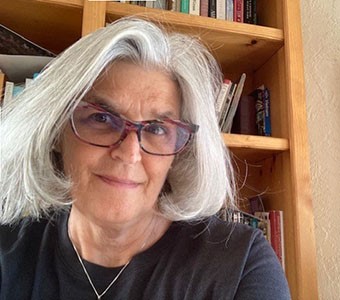Melissa Bokovoy

Professor
Regents' Lecturer in Arts and Sciences
Email: mbokovoy@unm.edu
Phone: (505) 277-2451
Office: Mesa Vista 2080
Education:
B.A., History, Pomona College
M.A., East European History, Indiana University
Ph.D., Eastern Europe since 1453, Indiana University
Research Interests:
Memory and History in the Balkans, World War I and II, Peasant society and culture
Research Statement:
My research focuses on how the peoples of Yugoslavia, over the span of 90 years, have lived under various regimes with fundamentally different political and socio-economic structures, and how they adapted to, changed, and resisted these regimes. My published archival research, conducted in Yugoslavia and its successor states, has examined the ways in which the twentieth century regimes in Yugoslavia, their political elites, structures, institutions, and ideologies, as well as their state and nation building processes and strategies, have interacted and impacted the society over which they ruled. I also examine how different groups within society--peasants, women, soldiers, and ethnic groups--reacted to political processes, informed state and nation building strategies, and influenced and shaped policies, identities, and ideologies.
Four projects have occupied me over the last 15 years. 1)Research of and writing on acts of remembrance and commemoration in interwar Serbia and Yugoslavia; 2)The collaborative publication of two sets of textbooks/readers(4 volumes) for use in Western Civilization and World History courses; 3)Co-directing an international team of scholars researching and writing on “Kosovo under Autonomy, 1974-1990” for “The Scholars' Initiative: Confronting the Yugoslav Controversies;” and 4) Participation in a comparative research project on the collectivization of agriculture.
Profile:
Melissa Bokovoy is professor and was chair of the history department (2013-2019 and 2022-2023) at The University of New Mexico in Albuquerque. She is currently past-president of the Association for Women in Slavic Studies after serving as president in 2021 and 2022. She also served a three-year term as an elected councilor of the Research Division of the American Historical Association.
Dr. Bokovoy has won awards and grants for her research, teaching, and service. In 2001, she was appointed University of New Mexico Regents’ Lecturer and a decade later was named UNM Outstanding Teacher of the Year (2011-2012). In 2013, she became co-principal investigator of UNM’s American Historical Association’s Career Diversity Pilot Program funded by the Andrew W. Mellon Foundation. She was the PI for the National Endowment for the Humanities’ Next Generation Implementation Grant (2016-2017). For 2015-2018, she was awarded, with Dr. Eleni Bastea, a NEH Enduring Question grant for the development of the interdisciplinary course: “How do Societies Remember” (2015-2018).
Recent/Select Publications:
Sharing the World Stage: Biography and Gender in World History 2 vols. Co-authors Jane Slaughter, Patricia Risso, Ping Yao, and Patricia Romero (2009)
Sharing the Stage: Biography and Gender in Western Civilization, co-author Jane Slaughter, (2003)
Peasants and Communists: Politics and Ideology in the Yugoslav Countryside, 1941-1953 (1998)
State-Society Relations in Yugoslavia, 1945-1992 (1997)
Articles
“Remembering the Balkan Wars.” Balkanologie: Revue d’études sur les Balkans. Volume 17, no. 1 (Summer 2022)
Book Forum: “Thinking Beyond Politics of Commemoration: A Historian’s Perspective.” Shofar: An Interdisciplinary Journal of Jewish Studies. Volume 40, no. 1 (Spring 2022): 166-171.
“Gender Matters.” A roundtable on Max Bergholz’s Violence as a Generative Force: Identity, Nationalism, and Memory in a Balkan Community, Canadian Slavonic Papers, 60:1-2 (Spring 2018), 311-333.
“Framing the Hero: Photographic Narratives of War in the Interwar Kingdom of Serbs, Croats, and Slovenes.” In Mark Cornwall and Paul Newman, eds. Sacrifice and Regeneration: The Legacy of the Great War in Eastern Europe. London: Berghahn, 2016. Pp. 190-220.
“Collectivization of Agriculture in Yugoslavia.” In Arnd Bauerkämper and Constantin Iordachi, eds. The Collectivization of Agriculture in Communist Eastern Europe: Comparison and Entanglements from the 1930s to the 1980s. Budapest: Central European University Press, 2014
“Chronology of Collectivization of Agriculture in Yugoslavia.” “Collectivization of Agriculture in Yugoslavia.” In Arnd Bauerkämper and Constantin Iordachi, eds. The Collectivization of Agriculture in Communist Eastern Europe: Comparison and Entanglements from the 1930s to the 1980s. Budapest: Central European University Press, 2014
“Kosovo under Autonomy, 1974-1990,” Momčilo Pavlović with Melissa Bokovoy, and Nebojša Vladisavljević. In Charles W. Ingrao and Thomas A. Emmert, eds. Confronting the Yugoslav Controversies: A Scholars' Initiative (Second Edition). Purdue University Press, Second Edition: 2013
“Consecrating Sites: Šabac, Cer and the Mačva Region in Serbia’s Commemorative Culture of the First World War.” Centropa: A Journal of Central European Architecture and Related Art. Volume 12, number 1(January 2012): (Theme: Ceremonies and Festivals in Central and Eastern Europe since 1918
“Gender and Reframing the First World War in Serbia during the 1980s and 1990s.” In Bonnie Smith and Joanna Regulska , eds. Women and Gender in Cold War Europe. New York: Routledge, 2012..
“Gendering Grief: Lamenting and Photographing the Dead in Serbia,” Aspasia: The International Yearbook of Central, Eastern, and Southeastern European Women's and Gender History. Volume 5(2011).
Awards:
Winner of the Association for Slavic, East European, Eurasian Studies’ Barbara Jelavich Prize for distinguished monograph on any aspect of southeast European or Habsburg studies since 1600 or on nineteenth or twentieth-century Ottoman or diplomacy, 1999
University of New Mexico Regents’ Lecturer, 2001-2004
UNM Outstanding Teacher of the Year for 2010-2011
Advisor, The University of New Mexico Board of Regents' Academic/Student Affairs and Research Committee, 2011-2014.
Member, Academic Council for East European Studies. Woodrow Wilson International Center for Scholars, Washington, DC.
Peter N. Kujachich Endowment in Serbian and Montenegrin Studies Annual Lecturer. Institute of Slavic, East European, and Eurasian Studies. The University of California, Berkely.
President and Board Member, Association for Women in Slavic Studies
Courses:
- Western Civilization II
- Everyday Life Under Socialism
- Cold War Europe through Film
- World War I
- World War II and Reconstruction in Europe
- Europe and the Balkans
- Women, War and Revolution
- Historiography
- Europe in 1989 and beyond
- Graduate Seminars: Nationalism; Gender, War, and Memory; Advanced Historiography
